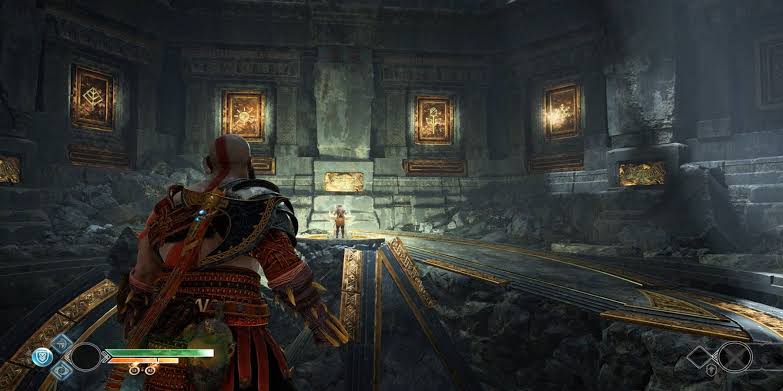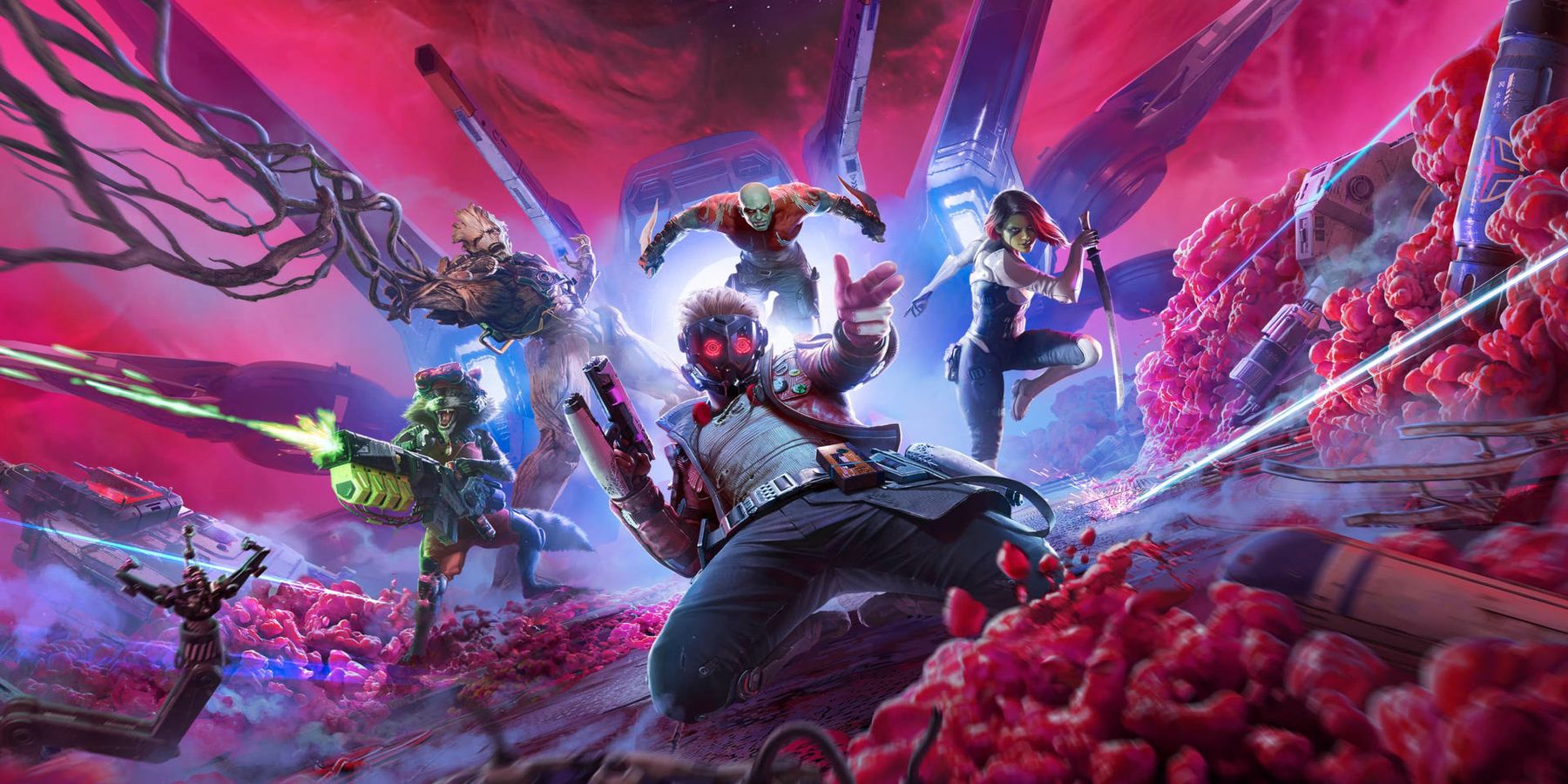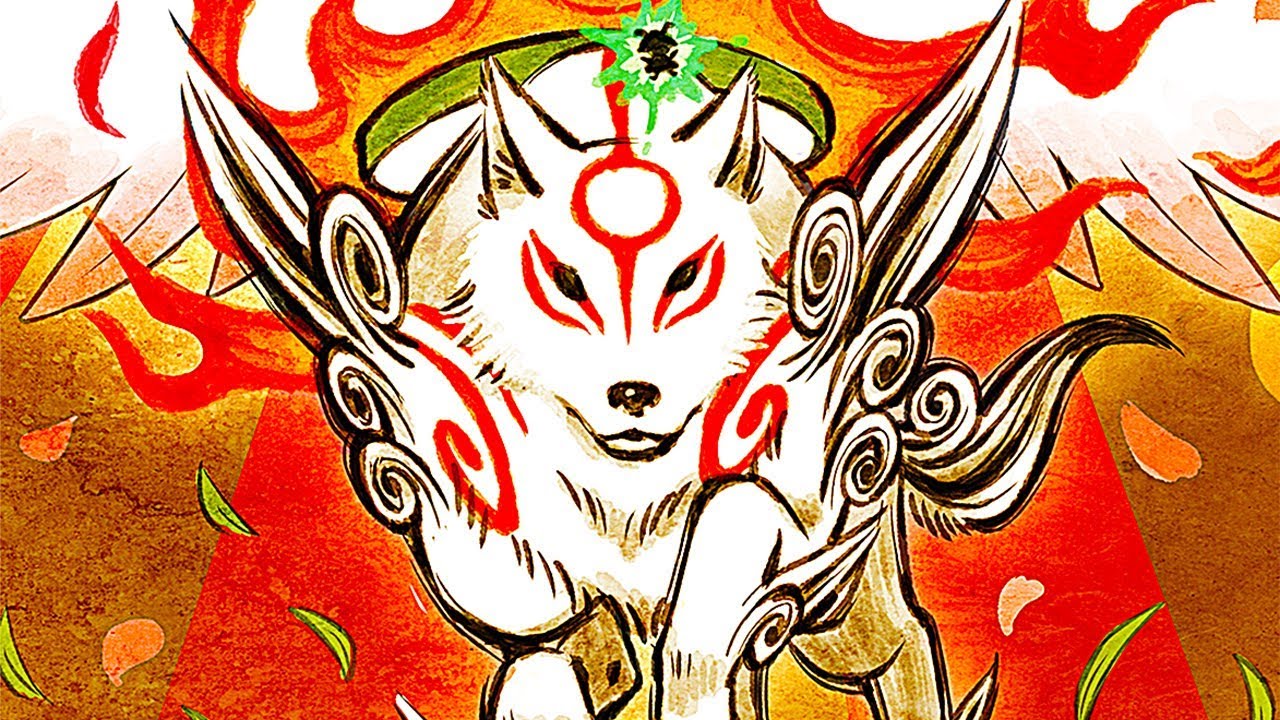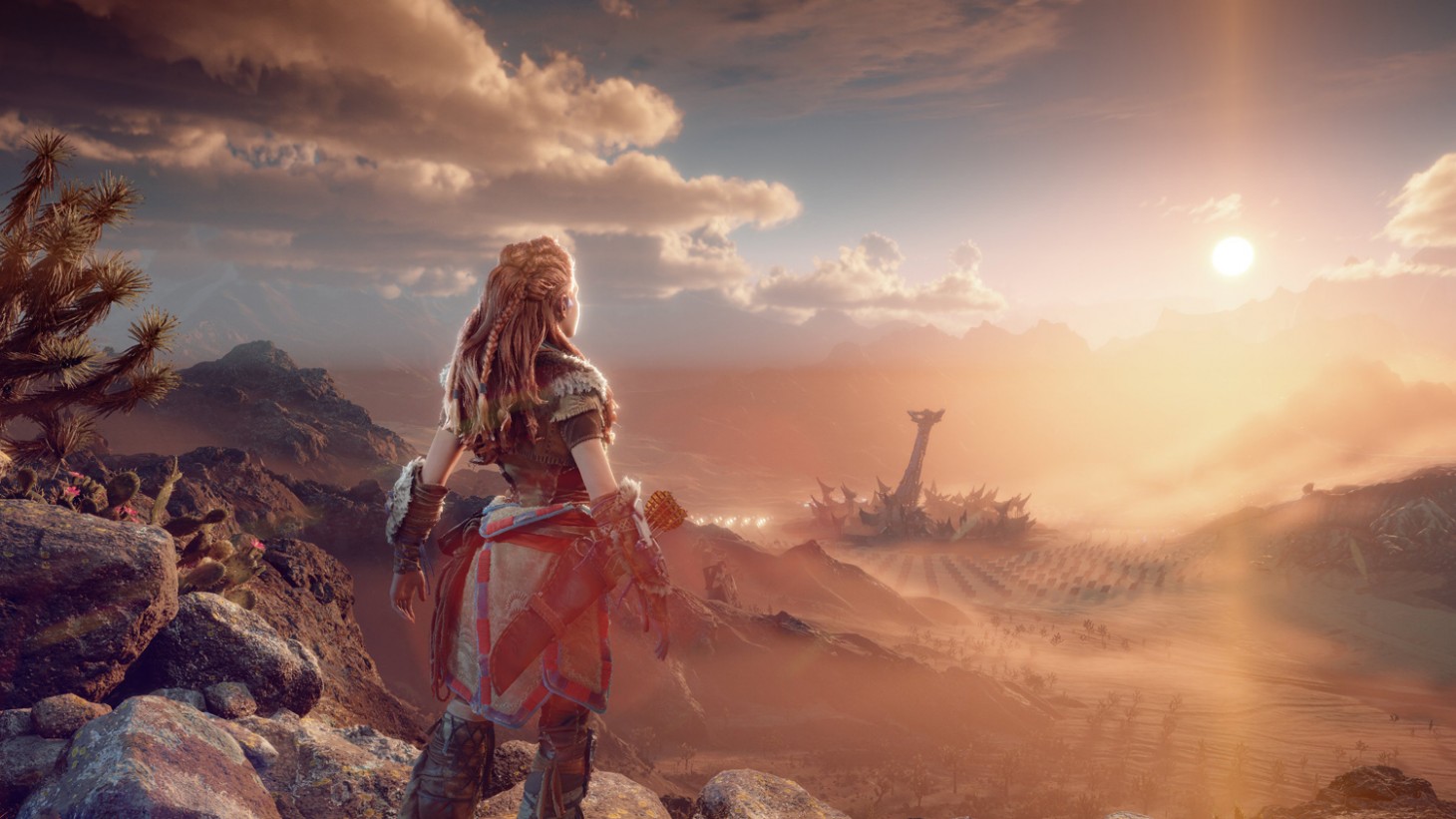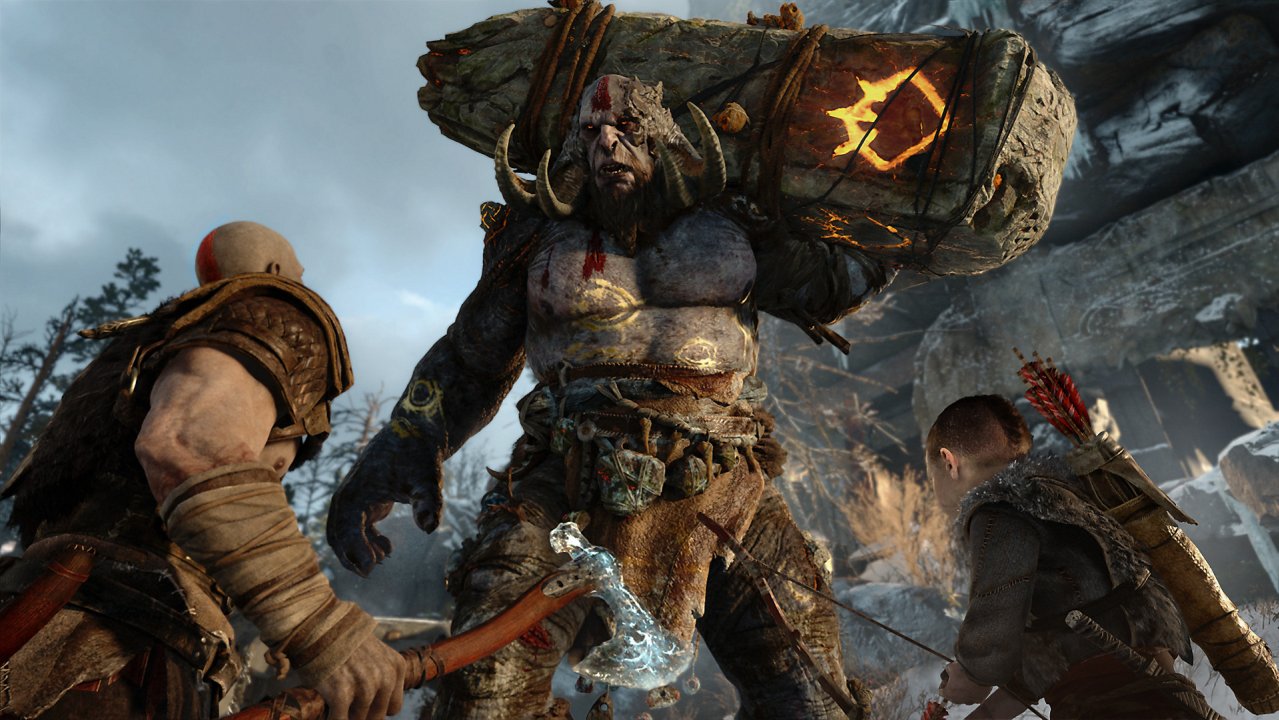

While I’ve known what they were for a while, it took me until this year to finally play the games that made Kratos a gaming icon. And while I didn’t love every part of it, I definitely found a lot to enjoy here. These games are far from perfect in a lot of areas, but they also do a lot right. And that’s not even touching on the Norse games, which managed to completely reinvent the revenge machine that is Kratos in a believable way. These games are as beloved as they are for good reason.
10. The Visceral Combat

Kratos mauling a centaur while Perses watches
Whether it's the top-down frenetic action of the Greek games or slower but still engaging battles of the Norse games, God of War is a series known for its combat. Back in the days of the Greek games, it would have been easy to argue it was the series’ best feature. Now with the Norse games, it's still good, but other elements like story have stepped up in comparison.
At its worst, the combat can get frustrating with too many annoying enemies or forcing you to beat them quickly or avoid certain parts of the room. But at its best, it can feel exhilarating as you tear through hordes of minions or topple massive beasts. It is moments like that that make it worth slogging through the bad bits.
Regardless of its form, this combat is very visually spectacular and action-heavy. The Greek games heavily featured quick time events, or QTEs, which I was mixed on. Generally, I dislike them as a whole, but outside of a few instances, they were incorporated very well in this series. Their usage in boss fights particularly allowed for grandiose animations… which could have just been a normal cutscene. So yeah, mixed thoughts here. This could apply to the combat as a whole: mostly very good, just with small annoying ticks I could do without.
9. The Always Present Puzzles

Boy, it's a puzzle again
And then there’s the other part of the core gameplay loop, and the one many players seem to dislike or are at least annoyed by. Puzzles when done well can be a very good part of a game, or even its entire identity. As for in God of War, well….
For the most part, I’d say they’re done fine. A lot are moving blocks, timing stuff, hitting the right object, yada yada. And well these can be tricky sometimes, but they’re generally not too bad. Some can even be good.
The problems arise with the obnoxious ones. The instadeath ones especially. This wasn’t a constant presence, but when it was there wow was it bad. The first game in the series is by far the biggest offender here, but at least they learned and barely used them going forward.
Otherwise, the puzzles were yeah, present. You’d be hard-pressed to find anyone who says they’re their favorite part of the games, but they’re usually not terrible either. And the Norse games even made them easier via in-game hints (which can be disabled), meaning they won’t take long if you don’t want them to.
8. The Wide Array of Weapons

Two of the most iconic weapons…. plus some themed after Zeus and Hercules cause why not
All that combat needs a wide array of weapons, and the Blades of Chaos and Leviathan Axe are iconic in that regard. Both have become immensely recognizable weapons in the world of gaming, despite having numerous versions throughout the series. And for good reason: swinging through enemies with the Blades or hacking into them with the Axe is immensely satisfying to pull off.
But these are far from the only weapons in the series. Shown in the header are two others: a lightning gauntlet featuring Zeus and massive blunt lion-themed objects taken from Hercules. Other standouts include the whip from 3 and the shield and spear from Ghost of Sparta, both of which I enjoyed using quite a bit.
The Blades and Axe are very well-made weapons, to the extent that most of the time you could get by using just them. But having variety in your arsenal is never a bad thing, even if a couple of them kind of suck. You’re up against a lot in these games, and sometimes switching your weapon can turn the tide completely. And don’t forget your magic, I did that far too many times.
7. The Graphic Brutality and Maturity

This Cyclops is going to need a new eye
One last bit about the combat before continuing on: the sense of brutality in these games is something to behold. So many things die in God of War, and the above image is how it often goes down. Bloodily, with the dying creature in immense pain.
This has become one of the series’ most well-known traits, with how savagely Kratos dispatches his foes. Those simply killed in combat get off pretty well, but those unlucky enough to fall victim to a kill animation? Its eyes out, torn out in half, cut open, crushed, take your pick. These games are very much not for the squeamish.
Connected to this is the maturity of the games, in different forms in Greek and Norse. The Greek games deal a lot with death, sex, and nudity, even having the infamous minigames with Aphrodite and other random women. Going to the Norse games, it is dealing with serious topics like fatherhood and Kratos living with what he has done in the past. And while the Greek games were considered tasteless in this regard by many, the Norse ones have received immense praise for these elements.
6. The Epic Music

Dad of War 2018, vinyl edition
This is one area in the series that has rarely faltered. Even the weakest games in the series had some solid music and the good ones? It's some of the most epic music I’ve heard in any game. Here’s a few examples.
God of War (2005) | Main Theme
1. God of War | God of War OST
I won’t spoil too much more of it but know that is all nearly all exceptional. There’s some alright stuff in there, but none I recall being bad. And that is not an easy thing for a game series to do. I’d even go as far as to say music is the most consistently good thing in the entire series, even with its spectacular combat. Easily among my favorite series as far as music is concerned.
5. The Thrilling Bosses

Somehow that is a boss, a very disturbing boss but a boss
I had to break this out separately. I mean look at that! That’s an actual boss in the third game!
True, Cronos there is a massive outlier, most of the bosses you fight aren’t quite that enormous. And while they don’t have that incredible sense of scale that Cronos does, a large portion of them are the highlights of their games without a doubt.
From a fight with Poseidon on top of Gaia to a beautifully lit clash with Thor on an ice-covered lake, these bosses are standouts of the series and action games in general. They force you to put to use everything you’ve learned about the game’s combat as you tackle literal gods. Can’t get much stronger than that.
It should be said not every boss in the series is amazing. Quite a few are annoying or just boring, and some are way too harsh on how long they take without checkpoints. Thankfully these were few and far between, but they were annoying when they were there.
But thankfully the vast majority of the bosses had that satisfying epic feel, and some proved to be rather difficult but not in a broken way. This is what you’d want from a good boss, and it made these fights memorable and rewarding. Exactly what you’d want considering who you’re up against in them.
4. The Grim Greek World

The ruined world in God of War III
The Greek world is the setting of the series prior to the PS4 game, and calling it dark would be an understatement. Even before the events of the third game, it is a grim setting characterized by war and death.
Much of it is in cities or caverns, or other somewhat natural areas. But with some exceptions, it is quite literally dark. This is not a bright and colorful world, it is a dull and dying one.
The multiple trips to the Underworld enforce this, as it is a dim area lit only by extremely fake-looking light. And that is true for much of this Greek world: it looks like a warzone because it is. And with that light and life are scarcities, aside from the light of unnatural colors and monstrous creatures trying to kill the people who aren’t already dead.
And that’s before the events of III when the deaths of the Greek gods by Kratos’ hand causes the realms they run to spiral into disaster. The oceans rise, the sun goes out, the dead return, and that’s just a couple of examples. We aren’t shown it happening but it's extremely likely the people living in the Greek world did not survive all this. Kratos' quest for revenge not only claimed the lives of the Greek gods but likely all of its people as well. That would have been an excellent time to be on vacation.
3. The Greek Revenge Story

Art of Katos about to attempt that jump
The story of the Greek games can be summed up in one word: revenge. To put it simply, Kratos was a Spartan general who served Ares but was tricked by said war god into killing his own family. Why? Seemingly just because he wanted to, and in doing so kicked off the entire chain of events that led to Kratos eventually tearing down Olympus.
The story was never the highlight of these games, and for someone like me who’s always enjoyed Greek mythology, seeing the gods actually die made no sense. But after a few games, I finally realized this was a unique spin on the mythos and wasn’t holding itself to any preconceived notions.
No, it was just meant to be a dumb fun revenge tale, and in that regard, it's done rather well. Kratos is not likely much at all in these games, even if you might sympathize with his desire for revenge. That’s fine and all, but he kills so many innocents along the way, both humans and gods who get in his way.
And then there’s the last-minute twist. Skip this part if you don’t want spoilers for the end of III…. it actually kind of makes sense? Pandora’s Box is brought back up, as when it was opened in the first game, it infested the gods with all the evils in it. Suddenly all of them wanting to kill Kratos makes sense: they were possessed by primordial evil. It's a bit sudden considering how late it's introduced, but it actually works with existing mythology, so I have to give it props for that.
And then the Greek world comes to a close with Kratos… killing himself? To give hope back to Greece? As I said earlier, I hadn’t played these games until this year, but I feel even if I had played this back when it came out, I still would have suspected this wasn’t the end. It's too vague and out of nowhere, seemingly there to give some hope that people in Greece survived the destruction. And to be fair, with as dark as this story went, that hope was very much needed.
2. The Norse Nine Realms

The Nine Realms are a lot colder and less dying
The Norse world is in stark contrast to the Greek one with its color. It's still fairly dim a lot of the time, but that’s due to a lot of dense forests. Here, the dying world is replaced by a live one, with much white snow and blue water. It is a very refreshing change of pace.
That’s not to say it is a bright world. War and blood still stain the land, but it's different this time. Far more friendly faces are here, not the least of which is Kratos’ son Atreus. Or as you may have heard him called, BOY. More on this in a little bit, but having him and the others here really helps to make these games feel more alive than their Greek predecessors.
And as this world pulls from Norse mythology, saying it is alive is accurate in more ways than one. You’ll encounter both the World Tree and World Serpent here, both of which give a sense of wonder to the world while maintaining the sense of scale from the past with Cronos.
And like with Greece, it is not a direct adaptation of Norse mythos. But it is much closer here. I am not as familiar with it as I am with Greece, but from what I recall this was much more accurate. Which was fitting for the story it wanted to tell.
1. The Norse Story of Fatherhood

Somehow Mr. Revenge became one of gaming’s best fathers
It is never directly stated how Kratos gets to the Norse realm from the Greek one, but hints suggest much time has passed. And in that time, Kratos has matured and become a father again, with his son being a prominent and alive part of the story in a way his daughter was not. (the story description here will be vague as Ragnarok is still fairly new)
In these games, Kratos is no longer the revenge-fueled God of War. Now he is merely an immortal trying to raise his son but is unable to escape his past. Somehow they took one of the most one-dimensional (or maybe two) characters in gaming and made players genuinely care about him. I don’t know how they did it but they did.
And said BOY? He’s a largely likable character who forms an excellent parallel with the worn-out Kratos. He is curious about the world in a way his father never was, and seeing Kratos deal with that brings out shades of him that people never knew existed.
I’ll end with one of the most memorable moments in the first Norse game: Kratos using the Blades of Chaos again. In the past he wielded them with no real remorse, cutting down all in his path. Now he has changed, and they remind him of who he once was. But he needs their power and solemnly uses them anyway. When a series can make a callback to such wanton carnage a somber moment, you know it's doing something right.
You may also like:
https://www.gamersdecide.com/pc-game-news/what-expect-when-god-war-comes-steam-january-2022
https://www.gamersdecide.com/pc-game-news/21-best-free-action-games-pc
https://www.gamersdecide.com/pc-game-news/best-killing-games




